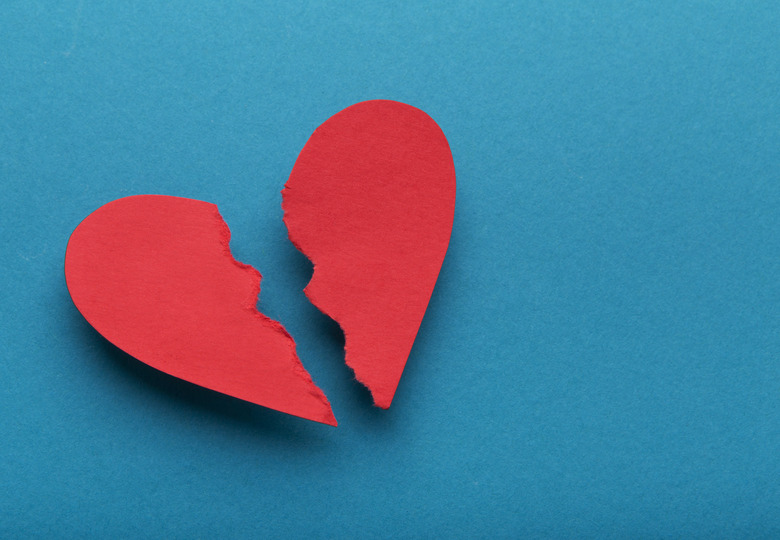Is Heartbreak Real?
It's Valentine's day, and love is in the air.
Well, at least in theory.
Chances are, if you just ended a relationship (and you're still getting over a breakup) Valentine's day probably isn't your favorite day of the year right now. And if you've only been through a breakup or two, heartbreak can hit especially hard.
And it turns out, there's a reason that heartbreak can feel so painful — and it's not all just in your head. Read on to find out how heartbreak really affects your body, and for some science-backed tips to get over it.
Heartbreak Means Dealing with Love and Loss
Heartbreak Means Dealing with Love and Loss
Before we chat about what happens when you're heartbroken, you need to understand why love feels so good in the first place. Turns out, being in love — or in "like" — with someone affects the hormone levels in your brain. Specifically, it boosts the levels of feel-good hormones like dopamine and serotonin, which is why being in love gives you warm, fuzzy feelings.
So what happens when those feelings go away? Well, those feel-good hormone levels drop, which leads to a dip in your mood. More importantly, the levels of stress-related hormones, like cortisol, goes up.
How Cortisol Affects Your Brain
How Cortisol Affects Your Brain
Cortisol is one of the main factors that lead to feelings of heartbreak. But, surprisingly, it still plays an important role in your health. Cortisol helps your brain (and body) deal with physiological stress. It can trigger your body's innate fight or flight response — the rapid heart rate, sharp breathing and hyper-awareness you experience when you're scared — and a rush of cortisol can be just what you need to escape a dangerous situation.
But cortisol can have negative effects, too. If your body maintains a high cortisol level for too long, you'll experience physical symptoms, like anxiety and nausea. It can also cause breakouts, and even make you gain weight — a not-uncommon occurrence after a breakup.
In general, your body release cortisol in response to stress or pain. That goes for both physical pain — say, if you broke your leg — as well as psychological pain, like a breakup. In other words, your body doesn't always process physical and mental pain differently, which is part of why heartbreak hurts so much.
Your Brain Can Take a While to Adapt
Your Brain Can Take a While to Adapt
Also adding to your heartbreak? The fact that while your relationship can end in a conversation, your brain isn't always so quick to catch up. That's what scientists discovered when they used medical imaging to look at brain activity after a breakup. They found that, while the study participants knew their relationships were over, their brain still responded to pictures of their exes as though they were still in love.
That can lead to prolonged feelings of loss. Think about it — when your brain is "tricked" into feeling like you're still together, it can feel like losing your ex all over again when you realize you're not.
Eventually, though, your brain catches up. Over time, it won't respond the same way when you see your ex. And, in other words, you'll get over it.
How to Get Over a Heartbreak Faster
How to Get Over a Heartbreak Faster
We'll be honest: the best cure for heartbreak is time, and getting over your first love can be especially tough, at least at first. With that said, these tips can help your brain adjust faster, so you can get over your heartbreak sooner.
- Give your ex space. It can feel all too tempting to text your ex at the end of the day, or check out their social media — especially if you want to stay friends. But the sooner you fall out of your "relationship routine," the sooner your brain will adjust.
- **Remember the bad times, too.** It's easy to wear rose-colored glasses when you're missing your ex — after all, you just want them back. But remind yourself of their negative qualities and the valid reasons you broke up. Studies show this can dampen your feelings of love over time.
- **Distract yourself.** Relationships take time, which means a breakup can leave a lot of empty room in your schedule. So fill it! Spend more time with your friends, hop into a Fortnite match, or use that time to reach your goals for the year.
Soon, your heartbreak will subside, and you'll be ready to date again.
Cite This Article
MLA
Tremblay, Sylvie. "Is Heartbreak Real?" sciencing.com, https://www.sciencing.com/the-science-of-heartbreak-13724854/. 14 February 2020.
APA
Tremblay, Sylvie. (2020, February 14). Is Heartbreak Real?. sciencing.com. Retrieved from https://www.sciencing.com/the-science-of-heartbreak-13724854/
Chicago
Tremblay, Sylvie. Is Heartbreak Real? last modified March 24, 2022. https://www.sciencing.com/the-science-of-heartbreak-13724854/
